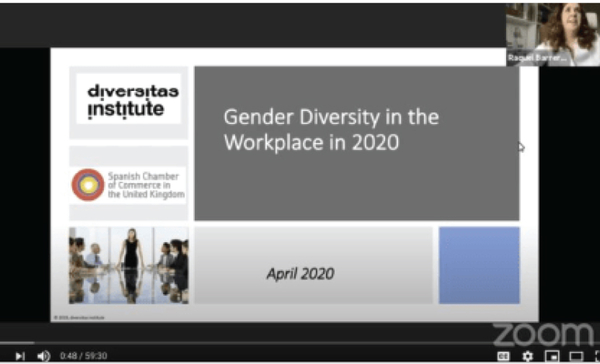Reflections about women and the digital economy in a post COVID-19 world
Yesterday I was reading a really interesting McKinsey article titled The Restart, about actions CEOs can take to ensure a relaunch of economic activity in their organisations. In particular, this article pointed out that accelerating digital transformation to serve new customer and employees needs would be a key factor in ensuring a safe and successful start. That sentence caught my attention and made me think of how the current Covid-19 pandemic is shaping the way we are integrating the digital technology in our lives and how digital transformation is going to be even more relevant in a post Covid-19 world. Undoubtedly, this crisis is acting as a disruptive element in the 4th industrial revolution we are now living in, accelerating the role that digital technology will have in shaping the future of our economies and the world around us.
On the other hand, as a STEM woman who strongly believes in gender equality, I always tend to introduce the gender perspective in the equation. My first thought was about the actual role women play in the digital economy. Are women well represented and positioned for the digital transformation new era? Are women ready for the future bearing in mind the importance and relevance of the digital transformation in the economy after the Covid-19 crisis? It also made me think about the fact that an active participation of women in the digital economy is a key factor to guarantee a more fair, diverse and creative working environment.
If we take a look at some facts and figures, in an European context, and according to the last report of the European Commission, Women in Digital, only 17% of the ICT specialists are women. In addition, only 19% of European ICT entrepreneurs are women. And, on top of that, the gender pay gap in the ICT sector is 20%.
There is a twofold challenge in this scenario: on one hand, we need to make women more visible. On the other hand, we have to attract, encourage and involve women in playing a more active role in the digital economy.
At this point, the question some people would ask is, “Why do we need to introduce this gender perspective?”.
The first obvious answer is because it’s the right thing to do. Women represent 50% of the population and they have to be an equal and fair part of the digital future. If we are building a new world we simply cannot leave 50% of the population out of it.
This answer should be enough and we shouldn’t be needing to search for any other reasons. However, for those who are looking for a business case justification, there are also several reasons that justify this approach:
- Digital transformation is not just about technology but about processes, and organisations, i.e. people, who are shaping this new reality. In this case, technology is not gender neutral. In fact, there is a gender data gap because women are invisible or under-represented in many domains of the digital economy. For example, in the AI domain, the lack of gender neutrality in some AI solutions can perpetuate systemic gender biases. In fact, in some cases they don’t just mimic the cultural stereotypes but amplify the existent inequalities. The reason why there is no gender neutrality is due to the algorithms behind these solutions are often biased towards men because the ones who are coding and training those algorithms are usually men. If women are not taken into account, there is a risk of the digital world to become more biased and the outcomes of this crisis could be worse than expected. Therefore, women’s active participation is crucial in order to shape a more fair, equitable and broadly represented world.
- Digital transformation is based in innovation and creativity. Several studies state that gender diversity and innovation are correlated. A more balanced presence of women in organisations leads to more creative thinking and more innovation, especially when women are involved in the decision-making and in top management positions.
- Promoting gender equality in the digital economy can be an opportunity to address the systemic issues that the digital sector is facing right now. One of the main issues is the difficulty in recruiting technological profiles. According to the report of the European Commission, Women in Digital “53% of companies trying to recruit ICT specialists report difficulties in finding qualified people”. Attracting women to the technology sector could have a positive impact in the talent pool. Organisations could benefit from a more diverse range of candidates in their demand for digital experts. In addition to that, a gender diverse workforce make organisations more attractive, both for new talent (as job seekers consider diversity as a motivating factor to accept a job offer) and for actual staff as an important factor in employee retention.
In conclusion, all these arguments portray that gender equality in organisations is now more relevant than ever, and must be encouraged and perceived as an opportunity to overcome the economic struggles that come with this crisis.



